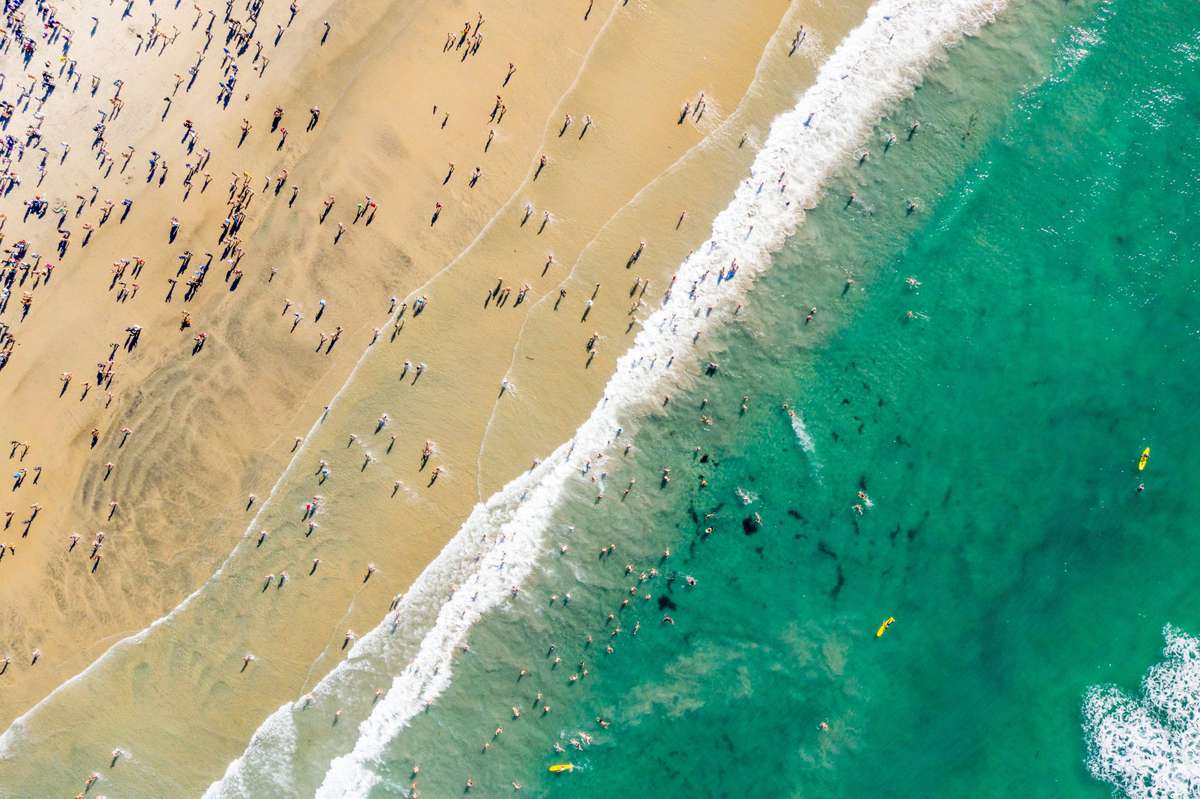There's nothing more quintessentially summer than going to the beach—swimming in the water, building sandcastles, applying (and reapplying, and reapplying some more) sunscreen. But with the COVID-19 pandemic still circulating in the US, what does the threat of the virus mean for potential beachgoers this summer?
Regardless of whether you're going for a day in the sun or a week at a beach house, there are some things you need to know before you decide to pack up and leave, and some extra steps you have to take if you decide to make the trek. Here's what you should be aware of to keep yourself and your family healthy.
What’s the risk of going to the beach right now—and is it safe to go?
As with any trip anywhere right now—the dentist, a hotel, an Airbnb—the main concern is your proximity to other people. Remember: COVID-19 passes from person to person mainly through droplets expelled when someone coughs, sneezes, or talks. When you're closer to a person infected with COVID-19—even if they're not showing symptoms—you have a greater chance of being exposed to those droplets and becoming infected yourself. The risk of going the beach right now is no different—especially if it's packed with vacationers.
It's also important to make sure you even can go to the beach right now. As states are opening up at different rates across the country, so are beaches. Beaches in New York State, for example, began opening on Memorial Day at 50%, with social distancing measures in place, according to a recent press release. Beaches in California and Florida, too, have begun reopening at reduced capacities and hours, to help beachgoers keep their distance from each other.
But if you can go, the beach is relatively safe, as long as you're taking all the recommended safety precautions, says Joseph Khabbaza, MD, a pulmonary medicine specialist at Cleveland Clinic. In fact, it may be a better alternative than gathering in an enclosed public space, adds Tania Elliott, MD, an infectious disease specialist at NYU Langone. “The open air and breeze make it less likely for respiratory particles to transmit, and the open expanses of the beach facilitate social distancing,” says Dr. Elliott. Generally speaking, it’s safer to be outside in public rather than inside public spaces such as shopping malls and community centers—again, as long as you're still practicing social distancing and wearing a mask when you can't.
RELATED: Is It Safe to Stay in a Hotel During COVID-19? What You Need to Know Before You Plan a Vacation
How can I stay safe at the beach?
There's only so much beaches can do to keep you safe. New York State's beaches, for example, have prohibited group activities, closed beachfront concessions, required masks, and enforced frequent cleaning precautions—but beachgoers have a responsibility to protect themselves and others, as well.
An easy way to think about it: Every rule you’d follow at a restaurant should also be applied to the beach, even though they're two very different scenarios. One of the most important rules to follow is still practicing social distancing—staying six feet away from others even when you’re outside (in reality, this should be easier to do outside than inside). “The beach, its size is helpful. It’s easier to find your six-feet circle,” Dr. Khabbaza says.
Masks are also another beach essential. While you don’t necessarily have to wear masks if you and the family members you’ve been quarantining with are the only people on the beach, you should still bring them to the beach to make sure you don’t fall out of the habit, and to have them readily available, if needed. "Still be in the habit of wearing a mask. It’s important to make a habit of it because we can quickly forget and find ourselves in close contact with others for prolonged periods of time without realizing it,” says Dr. Elliott.
RELATED: DIY Hand Sanitizer Recipes Have Taken Over the Internet—But Are They Even Safe?
Make sure you equip your beach bag with the tools necessary to protect yourself against COVID-19, too. Hand sanitizer and disinfecting wipes probably weren’t staples on your beach trip last year, but they should be now. And speaking of your beach bag, make sure to pack it with everything you might need. Buying from any vendors that might be open or borrowing items from other beachgoers right now isn't a great idea. If you go to the beach, try to keep to yourself as much as possible.
One small relief: You don’t need to worry much about contracting COVID-19 while swimming in saltwater, as long as you’re six feet from other swimmers, according to both Dr. Elliott and Dr. Khabbaza. “The virus is not going to live very well in salty water,” Dr. Khabbaza says. “The water-borne spread has not been shown at all.” However, once again, if you’re standing in shallow water, talking and standing close to other people, transmission can occur the same way it can if you, for example, go to the grocery store without a mask.
It's still fine to think of the beach as a place you can go to relax, but just remember that you still have to be mindful of your actions due to COVID-19. While, technically speaking, the beach is a relatively safe place to be (again, as long as all safety precautions are in place), that can really only be said if everyone’s doing their part to keep themselves and others safe.
The information in this story is accurate as of press time. However, as the situation surrounding COVID-19 continues to evolve, it's possible that some data have changed since publication. While Health is trying to keep our stories as up-to-date as possible, we also encourage readers to stay informed on news and recommendations for their own communities by using the CDC, WHO, and their local public health department as resources.
To get our top stories delivered to your inbox, sign up for the Healthy Living newsletter
